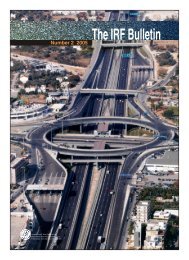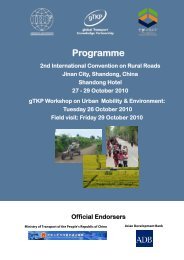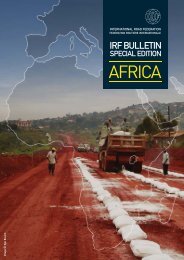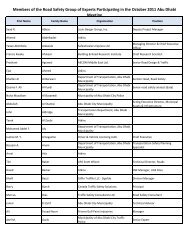TRANSPORT
TRANSPORT
TRANSPORT
- No tags were found...
Create successful ePaper yourself
Turn your PDF publications into a flip-book with our unique Google optimized e-Paper software.
SHARING THE ROAD<br />
response to competition. This stimulates adoption in other<br />
towns, peri-urban areas and large villages. Motorcycles then<br />
start to play important roles in rural transport. Examples of<br />
urban/periurban motorcycle taxis spreading into rural areas<br />
occur in Colombia, Cambodia, Nepal, Vietnam, Burkina<br />
Faso, Cameroon and Nigeria.<br />
Impacts on rural access and mobility<br />
Transport services between villages, market hubs and<br />
district centres in many developing countries are provided<br />
by ‘rural taxis’ (minibuses, 4x4s, pickups) and intermediate<br />
means of transport (motorcycles, bicycles, animals).<br />
Motorcycles are increasingly important. They are now the<br />
most numerous vehicles on some rural spokes in Colombia,<br />
Indonesia, Nepal and Timor-Leste. Motorcycles can operate<br />
on poor roads, passing road blocks caused by mud, water<br />
or landslides. Rural motorcycle taxis carry men, women and<br />
children, and their goods, to link poorly served villages to<br />
conventional transport services on main roads. Motorcycle<br />
taxis in rural communities benefit women, children and<br />
disadvantaged people through emergency and routine<br />
transport to health care and other services.<br />
but these are rare compared to motorcycle and threewheeler<br />
services.<br />
Gender and employment issues<br />
Women and men can ride motorcycles and benefit from<br />
the mobility they provide. However, for socio-economic,<br />
gender-power and cultural reasons, men are generally<br />
the main owners of transport devices. Accordingly, most<br />
motorcycles are owned and operated by men. In some<br />
countries, including Laos, Vietnam and Burkina Faso,<br />
many women own and ride motorcycles, but seldom are<br />
30% of urban motorcycles driven by women and the rural<br />
percentage is much lower.<br />
Motorcycle taxi passenger fares and freight tariffs are<br />
significantly higher per kilometre than rural taxis (Starkey,<br />
2008). Their comparative advantage is their availability and<br />
flexibility as they transport passengers immediately to their<br />
destinations.<br />
The profitability of motorcycle services led to similar private<br />
financing systems in Cameroon, Colombia, Rwanda<br />
and Tanzania. These systems allow all to benefit – the<br />
owners (often urban-based traders and civil servants),<br />
the operators (who rent the motorcycles), the passengers<br />
and the support services. This creates a critical mass and<br />
builds the momentum for rapid adoption of motorcycles<br />
and supporting services. The funding system allows<br />
private urban capital to fund rural transport improvements<br />
(Starkey, 2008).<br />
Motorcycle taxi carrying two women passengers and their<br />
goods in Cameroon<br />
Almost all motorcycle taxis are operated by men. They<br />
offer young men attractive livelihoods while stimulating<br />
employment in the supply and maintenance services.<br />
As motorcycle taxis are replaced regularly, second-hand<br />
markets enable greater, diversified adoption and higher<br />
maintenance service demand. Employment is stimulated<br />
by the economic benefits of passenger mobility and<br />
marketing opportunities. Motorcycle taxis enable some<br />
women entrepreneurs to travel rapidly to and from markets.<br />
Minibuses and three wheelers offer greater load capacities<br />
but motorcycles may be more available and timely.<br />
Motorised three-wheelers also benefit rural communities,<br />
although most provide urban and peri-urban transport.<br />
They have greater load-carrying capacity than motorcycles<br />
and are safer (particularly when transporting more than<br />
one passenger). They are not, however, as manoeuvrable as<br />
motorcycles for crossing rivers or skirting landslides. In some<br />
countries, including Colombia and Cambodia, motorcycles<br />
with trailers (four wheels in total) provide transport services<br />
Impact on safety and implications for regulation<br />
Motorcycles and motorcycle taxis present many problems of<br />
safety, regulation and enforcement. Young men operating<br />
motorcycle taxis are often risk-takers. Motorcycle taxis are<br />
also risky due to poor consideration by other road users,<br />
their lack of user protection, and their instability when<br />
balance is impaired (by potholes, loads, speed, knocks or<br />
alcohol).<br />
18<br />
| IRF BULLETIN SPECIAL EDITION: RURAL <strong>TRANSPORT</strong>, VOLUME-2
















